|
|
 |
|
Calanoida ( Order ) |
|
|
|
Clausocalanoidea ( Superfamily ) |
|
|
|
Aetideidae ( Family ) |
|
|
|
Chirundinella ( Genus ) |
|
|
| |
Chirundinella magna (Wolfenden, 1911) (F,M) | |
| | | | | | | Syn.: | Chirundina magna Wolfenden, 1911 (p.241, figs.F); Park, 1978 (p.176, Rem.);
Pseudochirella magna : Sewell, 1929 (p.129, figs.F); 1947 (p.96, 97, figs.F); 1948 (p.329, 523, 524, 527, 539); Vervoort, 1949 (p.48, figs.M); 1963 b (p.151, Rem.); Grice & Hulsemann, 1967 (p.15);
Chirundinella cara Tanaka, 1957 b (p.197, figs.F); Grice & Hülsemann, 1967 (p.14, 23, fig.F, Rem.); Grice, 1969 a (p.454) | | | | Ref.: | | | Tanaka, 1969 (p.265, figs.F, juv.M); Bradford & Jillett, 1980 (p.27); Vaupel Klein, 1984 a (p.51, figs.F, Table II: characters, Rem.); Markhaseva, 1996 (p.135, figs. F,M); Chihara & Murano, 1997 (p.684, Pl.25: F); Bradford-Grieve & al., 1999 (p.879, 919, figs.F,M) | 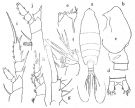 issued from : Tanaka O. in Publ. Seto mar. Biol., Lab., 1957, 6 (2). [Fig.57, p.198]. As Chirundinella cara. Female (from Sagami): a, habitus (dorsal aspect); b, head (lateral aspect); c, last thoracic segment and genital segment (lateral aspect); d, anal segment and furca (dorsal aspect); e, cutting edge of Md.; f, Mx2; g, basal joints of Mxp.; h, P1; i, P2; j, endopodite and basal joints of P4. Nota Female: - Cephalothorax about 4.2 times the abdomen lengths (6 : 1.44). - Head and 1st pedigerous segment separate, 4th and 5th thoracic segments fused. - Posterolateral corners of the last thoracic segment regularly rounded. - Rostrum with basal part robust. - Abdomen 4-segmented; segments and caudal rami in proportional lengths 42 : 15 : 12 : 17 : 14 = 100. ^genital segment produced moderately ventrally. - Caudal rami about as long as wide (12 : 11); appendicular seta aboutb 3 times as long as 2nd inner seta. - A1 24-segmented; extends distal end of caudal rami by distal 3 segments; segments 3, 7, 9, 18 and 21 each furnished with a long seta. - A2 endopod a little more than half the length of exopod (33 : 52). - Md endopod 3/5 the length of exopod (25 : 42); 2nd basal segment with 2 inner marginal setae. - Mx1 with 4 setae on the 2nd basal segment; 10 setae on endopod (14 in Chirundina; 14-15 in Pseudochirella and 10 in Undeuchaeta) thus the present specimen agrees with Undeuchaeta in the number of setae on endopod. - Mxp with a slender 2nd basal segment; 2 proximal setae on 2nd basal segment very closely set together; there is a row of spinules along the proximal anterior margin of 2bd basal segment. - P1 exopod 3-segmented, line of demarcation between 1st and 2nd exopodal segments distinct; outer edge spine of 3rd exopodal segment the longest. - P2 outer edge spine of 3rd exopodal segment reaches the level of proximal spine of 3rd segment; terminal spine as long as the combined lengths of the 3 exopodal segments taken together, and has 30 serrations; endopod distinctly 2-segmented. - P4 with 1st basal segment (= coxa) a row of long bristles (about 10) on the inner margin near the base of of inner marginal seta; terminal spine of exopod with 22 serrations.
- P5 absent.
|
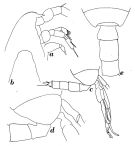 Issued from : W. Vervoort in Zool. Verh., Leiden, 1949, 5. [p.49, Fig.22]. As Pseudochirella magna. Male (from Flores Sea): a, forehead (lateral); b, idem (dorsal); c, last thoracic segment with P5 and urosome (lateral right side); d, last thoracic segment and 1st and 2nd urosomal segments (lateralright side); e, idem (dorsal). Nota: - Head with a distinct but low crest, protruded forwards, slightly dilated in the oral region. - The frontal organ is distinct. - Rostrum very strong. - Head and 1st thoracic segment fused, 4th and 5th fused. - The abdominal segments and caudal rami in the proportional lengths 17 : 25 : 25 : 21 : 3: 9 = 100. - The 1st abdominal segment with a distal swelling on the left lateral margin, 2nd with a minor swelling on the same side. 2nd to 4th abdominal segments are armed along their distal border with a row of very small, triangular spines. - Anal segment almost completely telescoped into the 4th abdominal segment, on the ventral side with a patch of hairs. - A1 (24 free segments) reaches the middle of the 4th-5th thoracic segments. - The mouth parts and 1st to 4th pairs of legs agree fully with those of the female.
|
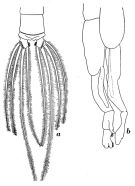 Issued from : W. Vervoort in Zool. Verh., Leiden, 1949, 5. [p.49, Fig.22]. As Pseudochirella magna. Male (from Flores Sea): a, distal part of the abdomen and furca (dorsal view); b, P5. Nota: The internal margins of the caudal rami are densely haired.
|
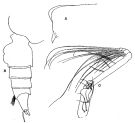 issued from : R.B.S. Sewell in The John Murray Expedition, 1933-34, Scientific Reports, VIII (1), 1947. [p.99, Fig.21]. As Pseudochirella magna. Female (from Arabian Sea): A, forehead (lateral); B, urosome (lateral left side); C, Mxp. Nota: The proportional lengths of the various segments of the body (cephalon to caudal rami) as 386:171:89:83:73:83:30:29:14:41:=1000. Forehead with a short median crest. Head and 1 st pediger segment fused, but the line of fusion can be clearly seen in the stained specimen, 4th and 5th fused. Posterior thoracic margin emarginate in the dorso-lateral region and rounded posteriorly. Anal segment with a tuft of hairs on the ventral aspect. A1 over-reaches the caudal rami by about the last three segments. A1 24-segmented (segments 8-9 fused, 24-25 separate). In Mx1 inner lobe 1 with 14 stout setae, inner lobe 2 with 4 setae, inner lobe 3 with 4 setae; basal segment 2 with 3 setae; endopod with 3, 3 and 5 setae; exopod with 11 setae; outer lobe with 9 setae. In Mx2 the basal segment bears on its posterior margin a nipple-like prominence; lobe 1 to lobe 5 each with 3 setae; endopod with 2, 1 and 3 setae from the various segment. In Mxp the proportional lengths of the two basal segments as 46 to 65.; the rounded prominence at the distal end of the 1st basal segment bears very fine spinules, from this lobe arise 3 setae and a forwardly-directed nipple-like prominence, which bears a very small blunt process. P4 bears a row of 13 fine needle-like spines on the 1st basal segment.
|
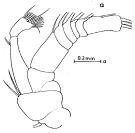 issued from : O. Tanaka in Publ. Seto Mar. Lab., 1969, XVII (4). [Fig.8]. Female (from off Peru): a, A2.
|
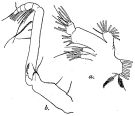 issued from : R.B.S. Sewell in Mem. Indian Mus., 1929, X. [p.130, Fig.49]. As Pseudochirella magna. Female (from Laccadive Sea): a, Mx1; b, Mxp.
|
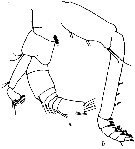 issued from : R.N. Wolfenden in Die Marinen Copepoden der Deutschen Südpolar-Expedition 1901-1903, 1911. [p.242, Fig.27]. As Chirundina magna. Female: a, A2; b, Mxp.
|
 issued from : R.N. Wolfenden in Die Marinen Copepoden der Deutschen Südpolar-Expedition 1901-1903, 1911. [Pl.XXVIII, Fig.10]. As Chirundina magna. Female: 10, habitus (lateral).
|
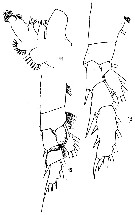 issued from : R.N. Wolfenden in Die Marinen Copepoden der Deutschen Südpolar-Expedition 1901-1903, 1911. [Pl.XXVIII, Figs.11-13]. As Chirundina magna. Female: 11, Mx1; 12, P1; 13, P2.
|
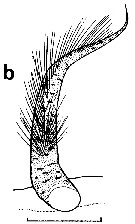 issued from : J.C. von Vaupel Klein in Crustaceana, Supplt 9, Studies on Copepoda, III, 1984. [p.63, Fig.5, b]. Female: b, condition of the distal small seta on A1 segment 5. Nota: modified, type II seta, thickened seta with thin, asymmetrical plumosy. (see Pseudochirella obesa p.63, fig.5,a) Scale bar 0.05 mm.
|
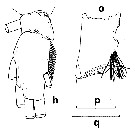 issued from : J.C. von Vaupel Klein in Crustaceana, Supplt 9, Studies on Copepoda, III, 1984. [p.84, Fig.18, h, o]. Female: h, stage of fusion of endopodal segments 1-2+3 of P2 (rightleg, anterior face, drawn from posterior) (note: a nearly completelyfree suture); o, basipodal segment 1 of left P4 (posterior view) (note: bears a close group of 14 long, stout, spiniform hairs or 'spikes', in a disto-medial position). Scale bars: q = 0.2 mm for h; p = 0.4 mm for o.
|
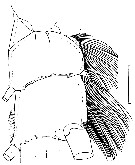 issued from : J.C. von Vaupel Klein in Crustaceana, Supplt 9, Studies on Copepoda, III, 1984. [p.78, Fig.15, i]. Female: i, fusion of exopodal segments 1 and 2 of P1 (left appendage, posterior view) (note: a completely free suture which exhibits no sign of fusion). Scale bar 0.1 mm.
|
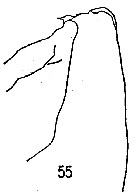 issued from : G.D. Grice & K. Hulsemann in Proc. U. S. natn. Mus., 1967, 122 (3583). [p.50, Fig.55]. As Chirundinella cara. Female (from Indian Ocean): 55, head (lateral). Nota: The only difference between this specimen and the description given by Tanaka (1957) are 11 rather 10 setae on the endopod of Mx1 and 3 rather 4 setae on the 5th lobe of Mx2.
|
 issued from : J.C. von Vaupel Klein in Crustaceana, Supplt 9, Studies on Copepoda, III, 1984. [p.80, Fig.16, e, f]. Female: e, number, shape, and size denticles along the lateral edge od the terminal seta on exopdal segment 3 of P1; f, detail of the same seta. Scale bar: 0.4 mm (e); 0.067 mm (f).
|
 issued from : J.C. von Vaupel Klein in Crustaceana, Supplt 9, Studies on Copepoda, III, 1984. [p.69, Fig.9, f]. Female: f, complement of terminal setae on the 2nd inner lobe of basipodal segment 1 of right Mx1 (details of right appendages in anterior view; to the posterior side 2 relatively stout setae are always present, which are combined bipectinate and spinulose; with 2 subequal, combined bipectinate/spinulose setae anteriorly) . Scale bar: 0.2 mm.
|
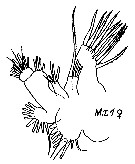 issued from : E.L. Markhaseva in Proc. Zool. Inst. RAN, St. Petersburg, 1996, 268. [p.137, Fig.104]. Female (from Tanaka, 1969): Mx1. Nota: Gnathobase with 9 claw-like terminal setae, 1 thinner short and 3 setae on the posterior surface. 2nd and 3rd internal lobes with 4 and 5? setae respectively. Protopodite near endopod base with with 4 setae.
|
 issued from : Tanaka O. in Publ. Seto mar. Biol., Lab., 1957, 6 (2). p.197]. As Chirundinella cara. Female A1: segments proportional lengths. - A1 24-segmented.
|
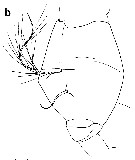 issued from : J.C. von Vaupel Klein in Crustaceana, Supplt 9, Studies on Copepoda, III, 1984. [p.68, Fig.8, b]. Chirundinella magna: Structure and setal armature of basipode 2 of Md (right appendage medial). 2 large setae condition.
|
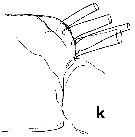 Issued from : J.C. von Vaupel Klein in Crustaceana, Supplt 9, Studies on Copepoda, III, 1984. [p.70, Fig.10, K]. Chirundinella magna: Setal armature on proximo-distal corner of basis (Ba2), adjacent to the endopod (Ri) of Mx1 (left appendage in postrior view; secondary structures on large setae are not shown, and neither are the hairs on the basis proper). 4 large setae, 3 of which in a row and the 4th inserting to the posterior side of the edge.
|
 Issued from : J.C. von Vaupel Klein in Crustaceana, Supplt 9, Studies on Copepoda, III, 1984. [p.72, Fig.11, g]. Chirundinella magna. Structure of Mx1, terminal configuration of setae plus the 'blunt tooth (= tubular pore) on the endite of basis (Ba2) (plumosity and/or spinules on setae, as well as hairs on lobe, omitted, right appendage in anterior view). Showing the usual Euchirella complement of, from anterior to posterior: short proximal seta (p), long central seta (c), blunt tooth (dotted outline) and shortest, distal seta (d). Contrary to E. curticauda (see Fig.11, a), a full euchirellinid complement, arranged as in Euchirella but though seta (d) and (4) are smaller sized relative to (p) and (c), the conditions are essentially the same as in Chirundina streetsii (Fig.11 f ) in Chirundinella magna .
|
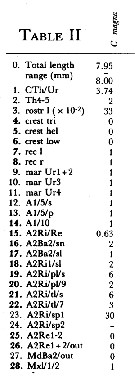 Issued from : J.C. von Vaupel Klein in Crustaceana, (Supplement) 9, 1984. [p.93, Table II ]. Chirundinella magna Female: Datamatrix stating observed states of characters from Table I (p.87-90) presently examined; nos. refer to the input nos. used in Table I (see to the family Aetideidae).
|
 Issued from : J.C. von Vaupel Klein in Crustaceana, (Supplement) 9, 1984. [p.94, Table II (cont' d) ]. Chirundinella magna Female: Datamatrix stating observed states of characters from Table I (p.87-90) presently examined; nos. refer to the input nos. used in Table I (see to the family Aetideidae).
|
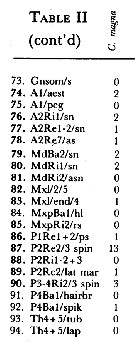 Issued from : J.C. von Vaupel Klein in Crustaceana, (Supplement) 9, 1984. [p.95, Table II (cont' d) ]. Chirundinella magna Female: Datamatrix stating observed states of characters from Table I (p.87-90) presently examined; nos. refer to the input nos. used in Table I (see to the family Aetideidae).
| | | | | Compl. Ref.: | | | Guangshan & Honglin, 1984 (p.118, tab.); Heinrich, 1990 (p.16) | | | | NZ: | 9 | | |
|
Distribution map of Chirundinella magna by geographical zones
|
| | | | | | | Loc: | | | South Africa, off Tristan da Cunha Is., off E St. Paul Is., G. of Guinea, Caribbean Sea, Arabian Sea, Maldive Is., off Laquedive Is., off SW Sri Lanka, SW Indian, Indonesia-Malaysia, Japan (Sagami), Pacif. (W equatorial), off Peru, Pacif. (SE tropical).
Type locality: Japan (Sagami Bay). | | | | N: | 9 | | | | Lg.: | | | (10) F: 6,6-6; (11) F: 8; (14) F: 8,9-8; (29) F: 6,2; (41) M: 6,7; (56) F: 7,44; (105) F: 8,1; (1257) F: 7,95-8,0; {F: 6,00-8,90; M: 6,70} | | | | Rem.: | Meso- to abyssopelagic.
For Tanaka (1957 b, p199) the specimen from Sagami (Japan) has a general resemblance to Chirundina, Undeuchaeta and Pseudochirella, but appendicular seta, the number of setae on 2nd basal segment and endopodite of Mx1, and the structure of P1 and P2 and also P4 are the characteristics features which distinguish the species from the other members of the closely allied genus. | | | Last update : 22/02/2021 | |
|
|
 Any use of this site for a publication will be mentioned with the following reference : Any use of this site for a publication will be mentioned with the following reference :
Razouls C., Desreumaux N., Kouwenberg J. and de Bovée F., 2005-2025. - Biodiversity of Marine Planktonic Copepods (morphology, geographical distribution and biological data). Sorbonne University, CNRS. Available at http://copepodes.obs-banyuls.fr/en [Accessed August 29, 2025] © copyright 2005-2025 Sorbonne University, CNRS
|
|
 |
 |























